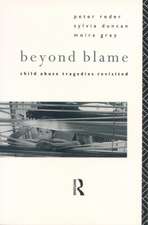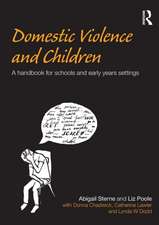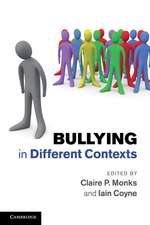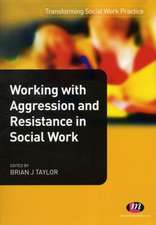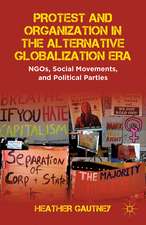Rethinking Serial Murder, Spree Killing, and Atrocities: Beyond the Usual Distinctions: Routledge Advances in Sociology
Autor Robert Shanafelt, Nathan W. Pinoen Limba Engleză Paperback – 30 iun 2020
| Toate formatele și edițiile | Preț | Express |
|---|---|---|
| Paperback (1) | 383.93 lei 6-8 săpt. | |
| Taylor & Francis – 30 iun 2020 | 383.93 lei 6-8 săpt. | |
| Hardback (1) | 1053.16 lei 6-8 săpt. | |
| Taylor & Francis – 6 dec 2014 | 1053.16 lei 6-8 săpt. |
Din seria Routledge Advances in Sociology
-
 Preț: 385.10 lei
Preț: 385.10 lei -
 Preț: 152.38 lei
Preț: 152.38 lei -
 Preț: 309.12 lei
Preț: 309.12 lei - 20%
 Preț: 296.87 lei
Preț: 296.87 lei -
 Preț: 334.09 lei
Preț: 334.09 lei -
 Preț: 204.46 lei
Preț: 204.46 lei - 9%
 Preț: 865.97 lei
Preț: 865.97 lei -
 Preț: 310.81 lei
Preț: 310.81 lei -
 Preț: 326.40 lei
Preț: 326.40 lei -
 Preț: 311.41 lei
Preț: 311.41 lei - 8%
 Preț: 388.97 lei
Preț: 388.97 lei -
 Preț: 288.87 lei
Preț: 288.87 lei -
 Preț: 311.33 lei
Preț: 311.33 lei -
 Preț: 311.41 lei
Preț: 311.41 lei -
 Preț: 303.42 lei
Preț: 303.42 lei -
 Preț: 301.50 lei
Preț: 301.50 lei -
 Preț: 326.63 lei
Preț: 326.63 lei -
 Preț: 152.29 lei
Preț: 152.29 lei -
 Preț: 311.41 lei
Preț: 311.41 lei -
 Preț: 309.94 lei
Preț: 309.94 lei -
 Preț: 316.13 lei
Preț: 316.13 lei -
 Preț: 160.58 lei
Preț: 160.58 lei -
 Preț: 334.09 lei
Preț: 334.09 lei -
 Preț: 309.46 lei
Preț: 309.46 lei -
 Preț: 386.77 lei
Preț: 386.77 lei - 8%
 Preț: 388.91 lei
Preț: 388.91 lei -
 Preț: 310.60 lei
Preț: 310.60 lei -
 Preț: 310.22 lei
Preț: 310.22 lei -
 Preț: 310.51 lei
Preț: 310.51 lei -
 Preț: 283.77 lei
Preț: 283.77 lei -
 Preț: 311.41 lei
Preț: 311.41 lei -
 Preț: 295.09 lei
Preț: 295.09 lei - 8%
 Preț: 383.57 lei
Preț: 383.57 lei - 18%
 Preț: 1111.55 lei
Preț: 1111.55 lei -
 Preț: 445.38 lei
Preț: 445.38 lei - 18%
 Preț: 701.88 lei
Preț: 701.88 lei - 18%
 Preț: 1053.92 lei
Preț: 1053.92 lei - 18%
 Preț: 1002.36 lei
Preț: 1002.36 lei - 18%
 Preț: 1057.89 lei
Preț: 1057.89 lei - 16%
 Preț: 248.31 lei
Preț: 248.31 lei - 18%
 Preț: 1003.30 lei
Preț: 1003.30 lei - 18%
 Preț: 1109.21 lei
Preț: 1109.21 lei - 18%
 Preț: 997.11 lei
Preț: 997.11 lei - 18%
 Preț: 1061.22 lei
Preț: 1061.22 lei - 18%
 Preț: 1058.06 lei
Preț: 1058.06 lei - 18%
 Preț: 1002.36 lei
Preț: 1002.36 lei - 18%
 Preț: 1113.12 lei
Preț: 1113.12 lei
Preț: 383.93 lei
Nou
Puncte Express: 576
Preț estimativ în valută:
73.46€ • 76.70$ • 60.80£
73.46€ • 76.70$ • 60.80£
Carte tipărită la comandă
Livrare economică 04-18 aprilie
Preluare comenzi: 021 569.72.76
Specificații
ISBN-13: 9780367599980
ISBN-10: 0367599988
Pagini: 204
Dimensiuni: 152 x 229 x 13 mm
Greutate: 0.32 kg
Ediția:1
Editura: Taylor & Francis
Colecția Routledge
Seria Routledge Advances in Sociology
Locul publicării:Oxford, United Kingdom
ISBN-10: 0367599988
Pagini: 204
Dimensiuni: 152 x 229 x 13 mm
Greutate: 0.32 kg
Ediția:1
Editura: Taylor & Francis
Colecția Routledge
Seria Routledge Advances in Sociology
Locul publicării:Oxford, United Kingdom
Public țintă
Postgraduate and UndergraduateCuprins
Introduction 1. On Killing, Murder and Extreme Violence in Biological and Historical Perspective 2. The Multiple Worlds of Multiple Murderers 3. From Normal to Brutal: Atrocities and the Persons Who Commit Them 4. None Too Tidy: Interacting Variables in the Development of Serial Murder, Mass Killing, and Atrocities. Conclusion: Beyond the Usual Distinctions.
Notă biografică
Robert Shanafelt (1957-2014) was an associate professor of anthropology in the Department of Sociology and Anthropology at Georgia Southern University.
Nathan W. Pino is a professor of sociology at Texas State University, where he conducts research on policing and police reform in an international context, sexual and other forms of extreme violence, and the attitudes and behaviors of college students.
Nathan W. Pino is a professor of sociology at Texas State University, where he conducts research on policing and police reform in an international context, sexual and other forms of extreme violence, and the attitudes and behaviors of college students.
Recenzii
"Anthropologist Shanafelt (d. 2014) and sociologist Pino (Texas State Univ.) offer the latest in the tradition of works that hold that the most individual of human behaviors can be explained in terms of social context. The authors argue that violent acts, even acts as unique and individual as spree killing and serial murder, can be understood by examining perpetrators' social contexts... The authors develop their argument though assessment of sources in history, anthropology, and sociology and argue that violence is a part of human behavior with specific expressions of violence defined as appropriate or inappropriate in specific social contexts. Any act of ending a person’s life can be justified or seen as appropriate in a specific context, given a specific person’s differential exposure to social experiences throughout his or her life."— R. T. Sigler, emeritus, University of Alabama, CHOICE Reviews
Descriere
Multiple killings by serial or spree killers and the mass violence seen in war crimes and other atrocities have typically been understood as discrete category types, which can foster the view that there are fundamentally different kinds of human beings, including "deviants" who are innately given to sadism or lack of empathy. This book considers


